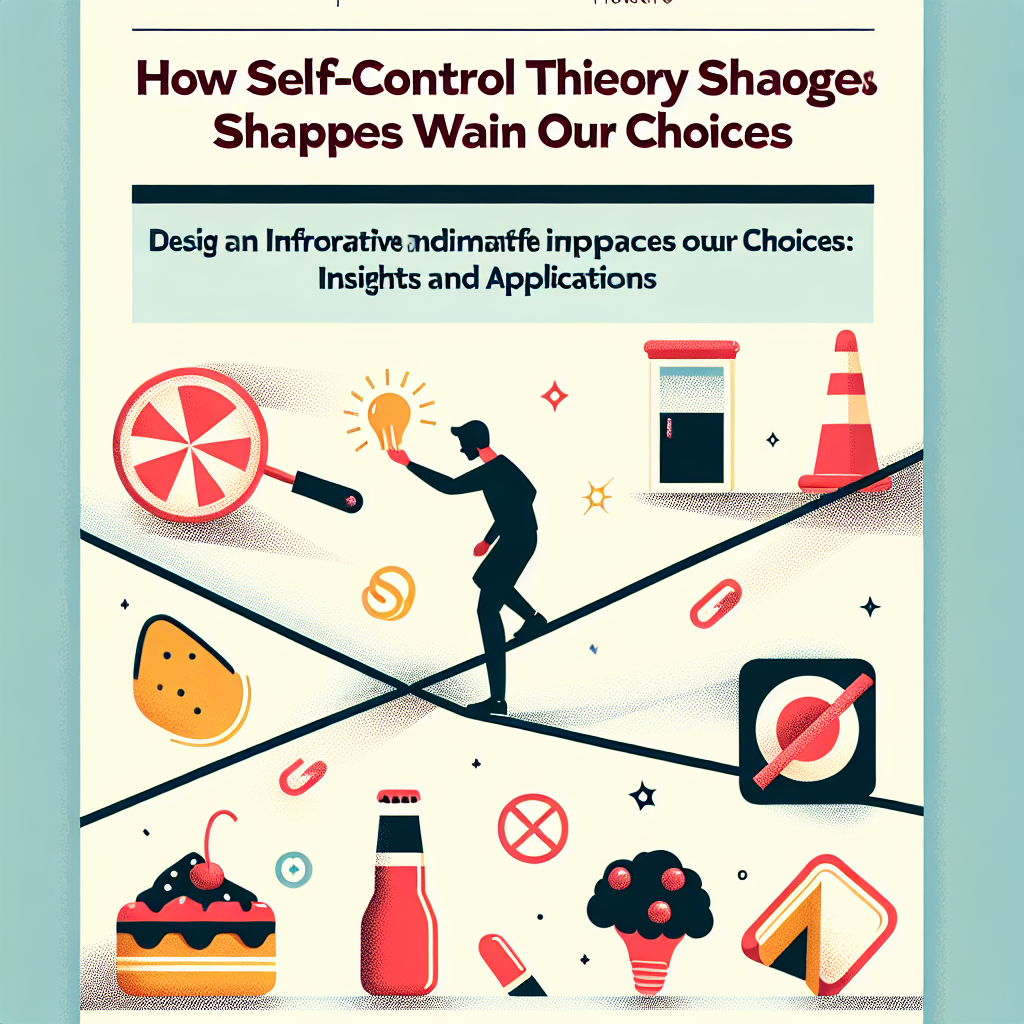
Introduction
Imagine standing in front of a delicious slice of chocolate cake, knowing you should probably avoid it to stick to your diet. In this moment, the internal battle between desire and discipline becomes a vivid illustration of self-control. This dynamic is not merely a personal struggle; it’s a deeply explored concept in psychology known as self-control theory. Understanding how self-control theory shapes our choices can transform the way we think about our decisions, impacting everything from health habits to financial planning.
In this article, we will delve into the intricacies of self-control theory, exploring its underlying mechanisms, real-life applications, and the profound implications it has for our daily decisions. By the end of this journey, you will not only appreciate the theoretical framework but also understand practical insights and positive applications in your life.
Understanding Self-Control Theory
The Core of Self-Control
Self-control, often viewed as the ability to delay gratification, plays a crucial role in our lives. According to self-control theory, the capacity to regulate one’s emotions, thoughts, and behaviors in the face of temptations forms the foundation for making choices that align with long-term goals.
The Mechanisms at Play
Temptation vs. Willpower: Our brains are wired to react to immediate rewards. The challenge lies in fostering willpower to overcome these temptations.
Cognitive Load: Stress and fatigue can diminish self-control, as these conditions hinder our ability to make rational choices.
- The Role of Environment: Modifying our environment can significantly influence self-control. By removing temptations or adding supportive cues, we can better manage our choices.
The Science Behind Self-Control
Research by Walter Mischel on delayed gratification, famously illustrated by the "Marshmallow Test," provides profound insights into the practice of self-control. This study revealed that children who resisted immediate gratification tended to have better life outcomes, demonstrating the long-term benefits of sustained self-discipline.
Table 1: Key Findings from the Marshmallow Test
| Outcome | High Self-Control Group | Low Self-Control Group |
|---|---|---|
| Academic Success | Higher | Lower |
| Health and Wellness | Better | Poorer |
| Financial Stability | Stronger | Weaker |
Application of Self-Control Theory in Everyday Life
1. Health and Fitness
Self-control is vital for maintaining a balanced diet and regular exercise. When faced with unhealthy food choices or a sedentary lifestyle, understanding how self-control theory shapes our choices can facilitate healthier habits.
Case Study: The Weight Watchers Program
Weight Watchers uses principles of self-control theory to empower its members. By encouraging goal-setting and providing accountability, the program helps individuals resist the temptation to stray from their diet, emphasizing long-term results over short-term satisfaction.
Analysis: This case study exemplifies how structured programs can utilize the principles of self-control to create effective support systems.
2. Financial Decision-Making
Managing finances necessitates self-discipline, particularly when it comes to saving versus spending. Self-control theory helps individuals recognize the importance of delaying gratification for future financial security.
Case Study: The "Save More Tomorrow" Program
This initiative, designed by Richard H. Thaler and Shlomo Benartzi, allows employees to commit to saving a percentage of their future salary increases. This approach effectively uses the self-control theory to alter spending behavior.
Analysis: The program demonstrates how strategic planning aligns with self-control theory, paving the way for better financial choices.
3. Personal Relationships
Self-control is equally crucial in maintaining healthy interpersonal relationships. The ability to manage emotions and behavior can lead to more fulfilling connections.
Case Study: Communication Skills Workshops
Workshops focusing on emotional regulation have shown an increase in relationship satisfaction. When individuals learn to control their impulses, they can interact more positively and constructively with others.
Analysis: This exemplifies how understanding and applying self-control theory can enhance personal connections, resulting in overall greater satisfaction in relationships.
Overcoming Barriers to Self-Control
The Role of Stress and Fatigue
Both stress and lack of sleep can severely impede self-control. Here, cultivating good habits around stress management and rest can create a robust foundation for better decision-making.
Strategies for Improving Self-Control
Set SMART Goals: Specific, Measurable, Achievable, Relevant, and Time-bound goals enhance clarity and focus.
Practice Mindfulness: Mindfulness techniques can help individuals become more aware of their impulses and make better choices.
- Positive Reinforcement: Rewarding oneself for small successes can sustain motivation and reinforce self-control.
Conclusion
Understanding how self-control theory shapes our choices leads to profound insights that can be applied to various aspects of life. Whether it’s improving our health, making smarter financial decisions, or enhancing personal relationships, the principles of self-control empower us to act in alignment with our long-term aspirations.
As we navigate the complexities of life, let’s not forget the power of self-control — it is indeed a key ingredient for success and fulfillment. Empower yourself today to harness this very tool for a brighter tomorrow.
FAQs
1. What is self-control theory?
Self-control theory is a psychological framework that focuses on the ability to regulate one’s emotions, thoughts, and behaviors, especially in the face of temptations.
2. How can I improve my self-control?
Improving self-control can be achieved through setting clear goals, practicing mindfulness, managing stress, and incorporating positive reinforcement methods.
3. Why is self-control important?
Self-control helps in making informed decisions that align with long-term goals, contributing to overall satisfaction in various life domains, such as health, finances, and relationships.
4. Can self-control be trained?
Yes, self-control can be trained through consistent practice and adopting strategies that promote delayed gratification and resilience against temptation.
5. What role does environment play in self-control?
The environment significantly influences self-control behaviors. By creating a supportive environment and reducing temptations, individuals can enhance their self-regulatory efforts.
This comprehensive exploration of How Self-Control Theory Shapes Our Choices: Insights and Applications demonstrates the theory’s relevance in daily life and its potential to lead to meaningful change. Embrace this knowledge to steer your choices toward a more fulfilling life.

















